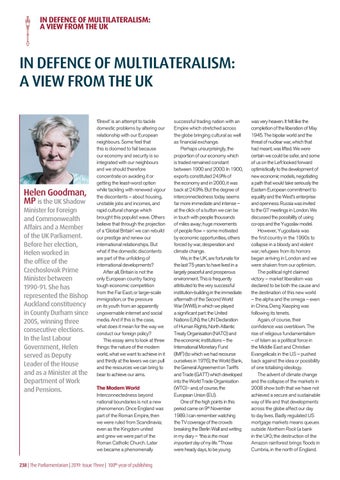IN DEFENCE OF MULTILATERALISM: A VIEW FROM THE UK
IN DEFENCE OF MULTILATERALISM: A VIEW FROM THE UK
Helen Goodman, MP is the UK Shadow
Minister for Foreign and Commonwealth Affairs and a Member of the UK Parliament. Before her election, Helen worked in the office of the Czechoslovak Prime Minister between 1990-91. She has represented the Bishop Auckland constituency in County Durham since 2005, winning three consecutive elections. In the last Labour Government, Helen served as Deputy Leader of the House and as a Minister at the Department of Work and Pensions.
‘Brexit’ is an attempt to tackle domestic problems by altering our relationship with our European neighbours. Some feel that this is doomed to fail because our economy and security is so integrated with our neighbours and we should therefore concentrate on avoiding it or getting the least-worst option while tackling with renewed vigour the discontents – about housing, unstable jobs and incomes, and rapid cultural change which brought this populist wave. Others believe that through the projection of a ‘Global Britain’ we can rebuild our prestige and renew our international relationships. But what if the domestic discontents are part of the unfolding of international developments? After all, Britain is not the only European country facing tough economic competition from the Far East; or large-scale immigration; or the pressure on its youth from an apparently ungovernable internet and social media. And if this is the case, what does it mean for the way we conduct our foreign policy? This essay aims to look at three things: the nature of the modern world, what we want to achieve in it and thirdly at the levers we can pull and the resources we can bring to bear to achieve our aims. The Modern World Interconnectedness beyond national boundaries is not a new phenomenon. Once England was part of the Roman Empire, then we were ruled from Scandinavia; even as the Kingdom united and grew we were part of the Roman Catholic Church. Later we became a phenomenally
238 | The Parliamentarian | 2019: Issue Three | 100th year of publishing
successful trading nation with an Empire which stretched across the globe bringing cultural as well as financial exchange. Perhaps unsurprisingly, the proportion of our economy which is traded remained constant between 1900 and 2000. In 1900, exports constituted 24.9% of the economy and in 2000, it was back at 24.9%. But the degree of interconnectedness today seems far more immediate and intense – at the click of a button we can be in touch with people thousands of miles away; huge movements of people flow – some motivated by economic opportunities, others forced by war, desperation and climate change. We, in the UK, are fortunate for the last 75 years to have lived in a largely peaceful and prosperous environment. This is frequently attributed to the very successful institution-building in the immediate aftermath of the Second World War (WWII), in which we played a significant part: the United Nations (UN), the UN Declaration of Human Rights, North Atlantic Treaty Organisation (NATO) and the economic institutions – the International Monetary Fund (IMF) (to which we had recourse ourselves in 1976), the World Bank, the General Agreement on Tariffs and Trade (GATT) which developed into the World Trade Organisation (WTO) - and, of course, the European Union (EU). One of the high points in this period came on 9th November 1989. I can remember watching the TV coverage of the crowds breaking the Berlin Wall and writing in my diary – “this is the most important day of my life.” Those were heady days, to be young
was very heaven. It felt like the completion of the liberation of May 1945. The bipolar world and the threat of nuclear war, which that had meant, was lifted. We were certain we could be safer, and some of us on the Left looked forward optimistically to the development of new economic models, negotiating a path that would take seriously the Eastern European commitment to equality and the West’s enterprise and openness. Russia was invited to the G7 meetings in London. We discussed the possibility of using co-ops and the Yugoslav model. However, Yugoslavia was the first country in the 1990s to collapse in a bloody and violent war; refugees from its horrors began arriving in London and we were shaken from our optimism. The political right claimed victory – market liberalism was declared to be both the cause and the destination of this new world – the alpha and the omega – even in China, Deng Xiaoping was following its tenets. Again, of course, their confidence was overblown. The rise of religious fundamentalism – of Islam as a political force in the Middle East and Christian Evangelicals in the US – pushed back against the idea or possibility of one totalising ideology. The advent of climate change and the collapse of the markets in 2008 show both that we have not achieved a secure and sustainable way of life and that developments across the globe affect our day to day lives. Badly regulated US mortgage markets means queues outside Northern Rock (a bank in the UK); the destruction of the Amazon rainforest brings floods in Cumbria, in the north of England.
